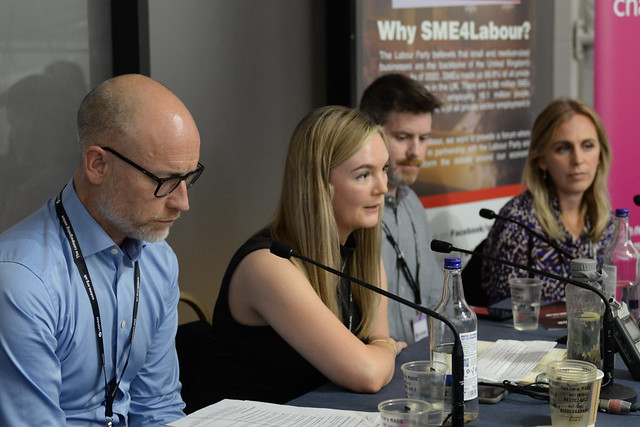The Labour Party Annual Conference 2023
SME4Labour and Community Union fringe: Is Manufacturing Labour’s Future?
🗓 Date: Sunday, 8 October 2023
⏳ Time: 17:00
📍Location: SME4Labour POD (Meeting Room 22), ACC Liverpool, Kings Dock Street, Liverpool, England, L3 4FP
SME4Labour and Community Union fringe: Was Manufacturing Labour’s Future? with Stephen Kinnock MP, Minister for Immigration; Graham Lanktree, Politico; Torsten Bell, Chief Executive of the Resolution Foundation; Alan Coombs, Community Union, Steel and metals sector representative and Anna Valero, Senior Policy Fellow at the LSE’s Centre for Economic Performance. This panel discussion was chaired by Kate Dearden, Community Union, Head of Research, Policy & External Relations.
Kate Dearden initiated the panel discussion by highlighting the challenges faced by the manufacturing sector in recent years. She mentioned the difficulties brought about by the business climate, government policies, and the struggles of companies organized by the union. Despite these challenges, she also noted some positive news, with the UK’s manufacturing output increasing to £224 billion, leading to an improved global ranking.
Stephen Kinnock emphasized the importance of the UK’s steel industry for reasons such as national security, job creation, and supporting the transition to a net-zero carbon economy. Kinnock highlighted the challenges faced by the steel industry due to government policies, energy costs, and international competition. He stressed the need for a strong and viable steel industry to transition to a net-zero economy successfully, as steel is crucial for building wind turbines and other sustainable infrastructure. Kinnock also criticized the Conservative government’s lack of support for the steel industry and called for a Labour government to implement a clean steel fund. He discussed the recent deal between Tata Steel and the UK government, suggesting that it should have been more ambitious and included consultation with trade unions.
Torsten Bell discussed the significance of manufacturing in the context of the UK’s economy. He stressed that while manufacturing is important, it cannot be the sole driver of economic transformation. Many social Democrat parties globally focus on manufacturing for green economies, but Bell argued that it wouldn’t provide enough high-quality jobs or productivity to make the country affluent. He emphasized the need to focus on both the quality and quantity of manufacturing. Bell addressed the shrinking of manufacturing due to deindustrialization, suggesting that the UK should shift its focus as global trade patterns indicate that services trade is growing faster than goods trade. Despite concerns about the quality and quantity of manufacturing, Brexit has added complexity to the situation by altering the nature of manufacturing. Bell pointed out that Brexit affects the manufacturing sector differently, pushing it towards the less productive areas that serve smaller domestic markets, such as food manufacturing. In summary, Bell highlighted the importance of diversifying the economy and addressing the challenges facing manufacturing, with Brexit playing a role in reshaping the sector.
The discussion’s focus was on how manufacturing could contribute to Labour’s economic growth, stability, and resilience agenda, considering Labour’s economic strategy for the current landscape and the future. The panel aimed to explore ways in which Labour could support the domestic manufacturing industry and ensure its continued growth and success.

